By Valerie Miller
On June 5, 2021, the United Nations launched the Decade on Ecosystem Restoration. The aim of this decade is “to prevent, halt and reverse the degradation of ecosystems on every continent and in every ocean.” In the month since that day, I have really thought a lot about the importance of land reclamation and ecological restoration and what we can do.
Officially, I began my reclamation career when I started my PhD in Land Reclamation at the University of Alberta in 2012. Honestly though, it started before that. Growing up in a small town, I was almost always surrounded by nature. I remember childhood projects of tree planting or painting fish on stormwater grates. Going to university, I decided to study biology and environmental science and Trent University could not have been a better place. With the Otonabee River running through the centre of campus and trees surrounding most of it, I haven’t seen a campus more integrated with nature.
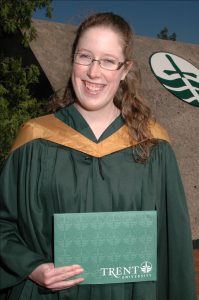
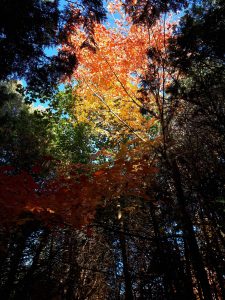
Valerie’s graduation from Trent University in 2011 (left) and the glorious fall colours from near Elora, Ontario (right).
I fell in love with the Arctic just after my third year. Offered a research position on Akimiski Island, Nunavut to study the nest defense behaviour of Canada Geese, my eyes were opened to a new world. We spent over two months on this uninhabited island in James Bay where there were more polar bears than people. It was amazing. I followed this up after my fourth year by spending nearly two months at Ivvavik National Park, Yukon, studying nest site selection of Upland Sandpipers. On the edge of the treeline, we saw the caribou migrate through the Park and lived in the land of the Midnight Sun.
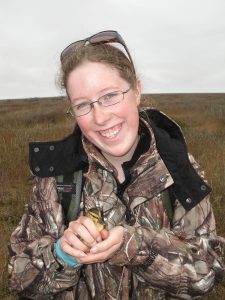
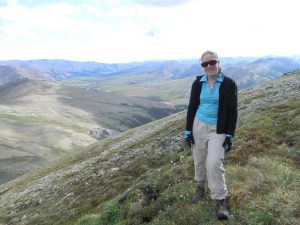
Falling in love with the Arctic in Akimiski Island, Nunavut (left) and Ivvavik National Park, Yukon (right).
I loved my experiences studying birds in the Arctic, but when I finished my degree at Trent, it wasn’t ornithology that I decided to continue in. I spent two summers in ecosystems barely touched by humans, yet there are few places in the world where this is possible. Humans need land – for food, homes, transportation, other resources – and we will disturb the land to get them. Therefore we need to know how to make the land healthy again, we need land reclamation. Land reclamation is the process of converting disturbed or damaged land to its former, a type of reclamation called ecological restoration, or other productive uses.
Moving to Edmonton in 2012, I started my PhD building soils using mine waste materials at a diamond mine in the Northwest Territories (I wasn’t ready to give up the Arctic yet). Soils are the foundation of ecosystem development, yet in northern disturbances, we often don’t have access to soil for reclamation due to low amounts that can be collected prior to disturbances and remote locations for transporting. Hence the necessity for building soils using the materials that we do have on site, materials like rocks, sand, and sewage, and testing different ways of combining and placing.
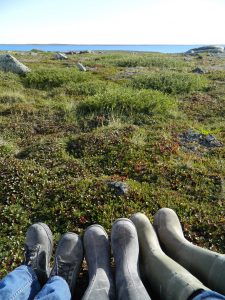
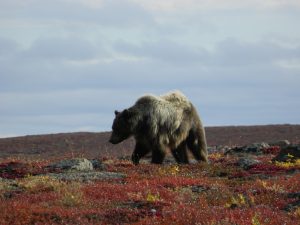
Ecosystems and wildlife surrounding the research sites at the diamond mine in the Northwest Territories.
Watching plants return to formerly barren areas is inspiring, a hope for the future, that we can help the land recover from our actions. There is still so much to do though, so much to learn and I plan to keep doing that. Now I am the Coordinator of the Land Reclamation International Graduate School, a group that I was a member of for the seven years of my PhD. Together with my fellow staff members and participants, we seek to keep learning about land reclamation and how to become leaders in the industry and leaders in #GenerationRestoration.
My journey to become part of #GenerationRestoration began over a decade ago, from undergrad to graduate school to my career. However, you can play an important role in the UN Decade on Ecosystem Restoration today. Let’s explore some ways how:
- Explore nature. A big part of protecting nature is loving nature and being in it. So, take the time to go on that hike, find a park in your neighborhood, sit out in the sun. Or if you are me, with very burnable skin, sit under the shade of a tree.
- Learn about nature. There are countless organizations with resources to help you explore nature online and in person. Once you know more about nature, share it with others and become an educator yourself.
- Start small. Actions towards protecting the Earth do not need to be huge. Consider the small things that you can do – plant a pollinator garden, buy locally grown food, compost your food waste (reduces garbage but also makes a great amendment for your soil).
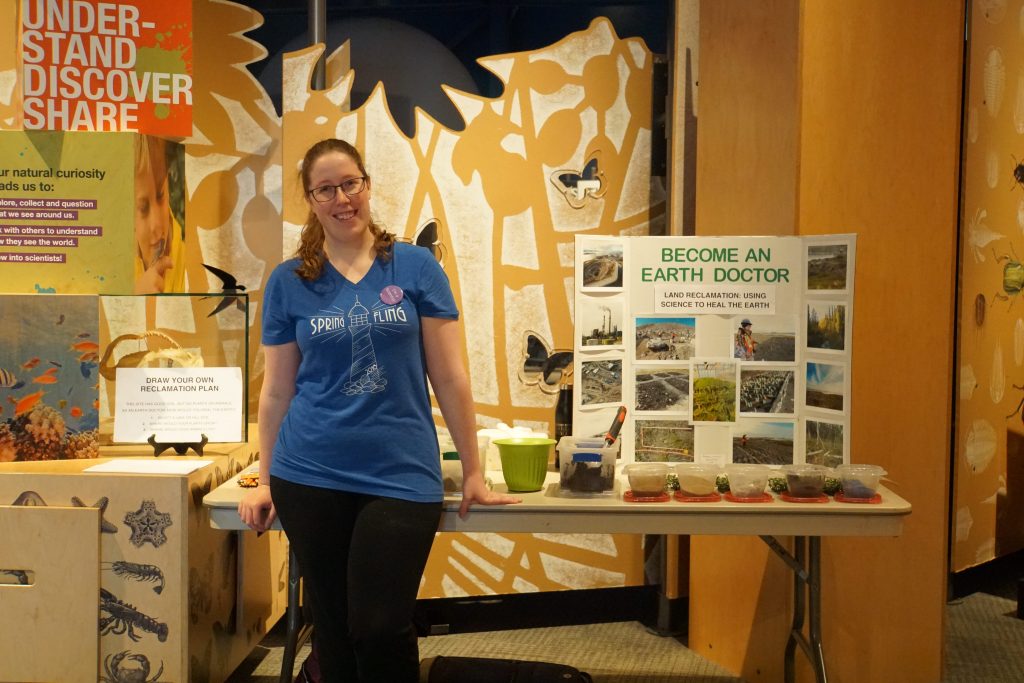
Sharing her passion for land reclamation, Valerie explores “Becoming An Earth Doctor” with guests at Telus World of Science.
- Volunteer. Reach out to organizations in your community and donate your time. Examples of projects would be tree planting, picking up litter, trail maintenance, invasive species control and more. These can be great opportunities to make a difference and meet others who are passionate about protecting the Earth.
- Donate. According to the UN Decade on Ecological Restoration strategy, “organizations driving activities on the ground are often underfunded and face long-term financial insecurity.” Consider donating to organizations who are working on restoration projects, either in your community or elsewhere.
- Explore career and education opportunities. If you have decided that you want to work in land reclamation, explore what careers interest you. Do you want to focus on the technical challenges or do you want to work on the social side? Are you more interested in plants or soils? Then explore the educational opportunities available for those interests – whether it is classes in high school, a college or university program, or an after degree or extension program, all can lead you to various careers about the environment.
It is time to start your journey of being a leader in #GenerationRestoration!!

